Key takeaways:
- Rejection letters are common in professional journeys and often indicate a lack of fit rather than a reflection of personal talent.
- Seeking feedback after rejection can provide valuable insights for improvement and foster a proactive approach to future applications.
- Reframing rejection as an opportunity can lead to growth, new passions, and a stronger foundation for future endeavors.
- Emotional responses to rejection can be processed and transformed into motivation, helping to cultivate resilience and determination.
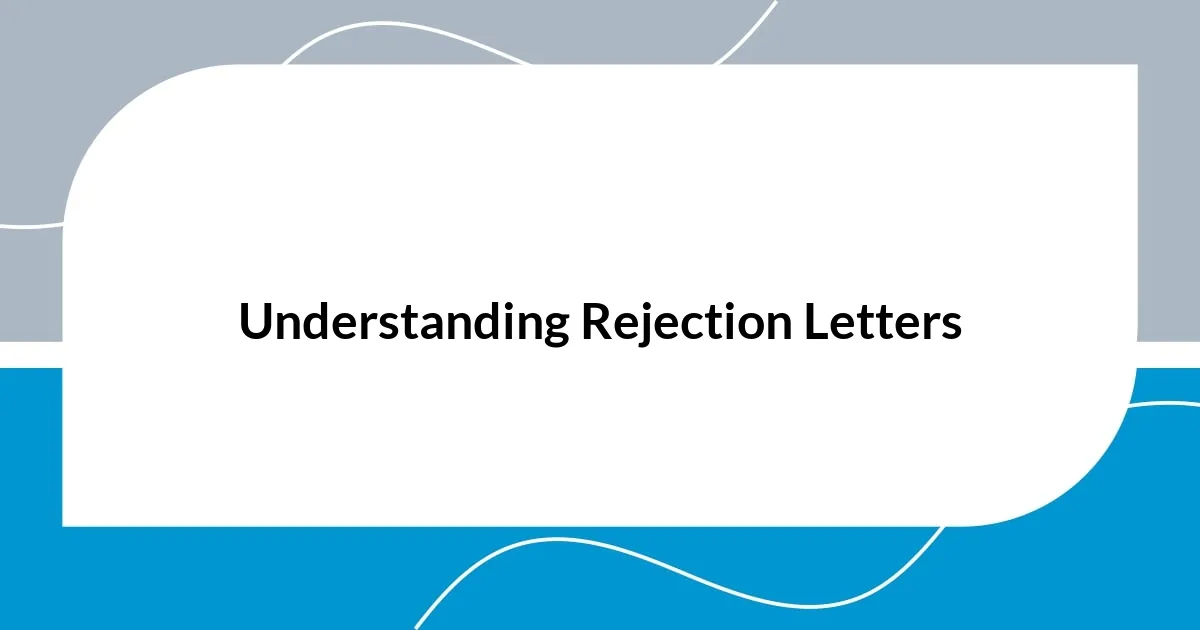
Understanding Rejection Letters
Rejection letters often feel like a punch to the gut, don’t they? When I received my first rejection letter after sending out so many applications, it stung deeply. It made me question my abilities and worth, leaving me wondering if I was on the right path. What I learned, though, is that a rejection isn’t necessarily a reflection of my talent but rather a sign that I might not have been the perfect fit for that particular opportunity.
It’s important to recognize that rejection letters are a routine part of any professional journey. Each time I’ve faced rejection, I’ve tried to see them as stepping stones rather than stumbling blocks. For instance, after a particularly tough letter, I took a step back and evaluated my approach. Was I targeting the right audience or addressing the key points they sought? More often than not, these letters nudged me towards reflection and growth instead of despair.
Still, I can’t forget the weight of the words within those letters. They often come with polite phrasing, but underneath that politeness lies the reality that someone else was chosen. It’s a hard pill to swallow. When I’ve encountered this, I’ve found it incredibly helpful to reach out and ask for feedback, turning that moment of disappointment into an opportunity for dialogue and self-improvement. Have you ever done that? It’s amazing how a little insight can shift your perspective from feeling defeated to motivated for the next adventure.
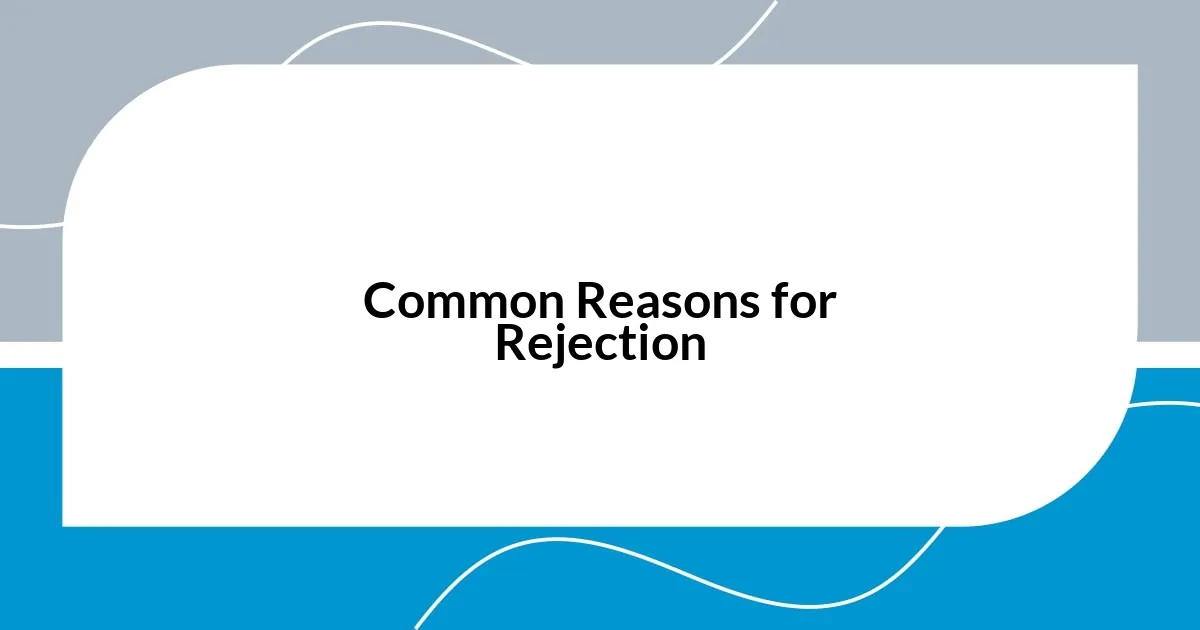
Common Reasons for Rejection
Rejection can stem from a variety of common issues that often have little to do with your actual qualifications or skills. I’ve noticed that sometimes, it’s simply a matter of timing; the market changes, or a specific candidate happens to fit the company’s need perfectly at that moment. In my experience, I’ve seen applicants get passed over for reasons like:
- The hiring manager’s existing preference for a veteran or internal candidate.
- A misalignment of values or culture that impacts the way teams work together.
- The specific wording in a cover letter that didn’t resonate with what they were looking for.
Other times, it’s about competition. I recall submitting a proposal that I poured my heart and soul into, only to learn that there were several other candidates with direct connections to the committee. Those moments can sting, but they remind me that being the best fit means more than just skills; sometimes it’s about the broader context within which those skills are showcased or perceived.
I’ve also learned that even minor details can lead to rejection. For instance, during my early job searches, I remember being turned down for a position because my resume wasn’t tailored to highlight the specific experience they were after. It was a wake-up call for me, illustrating how vital it is to align your application materials with the job description. This realization helped me hone my approach, and I began to see rejection as a valuable teacher rather than a simple setback.
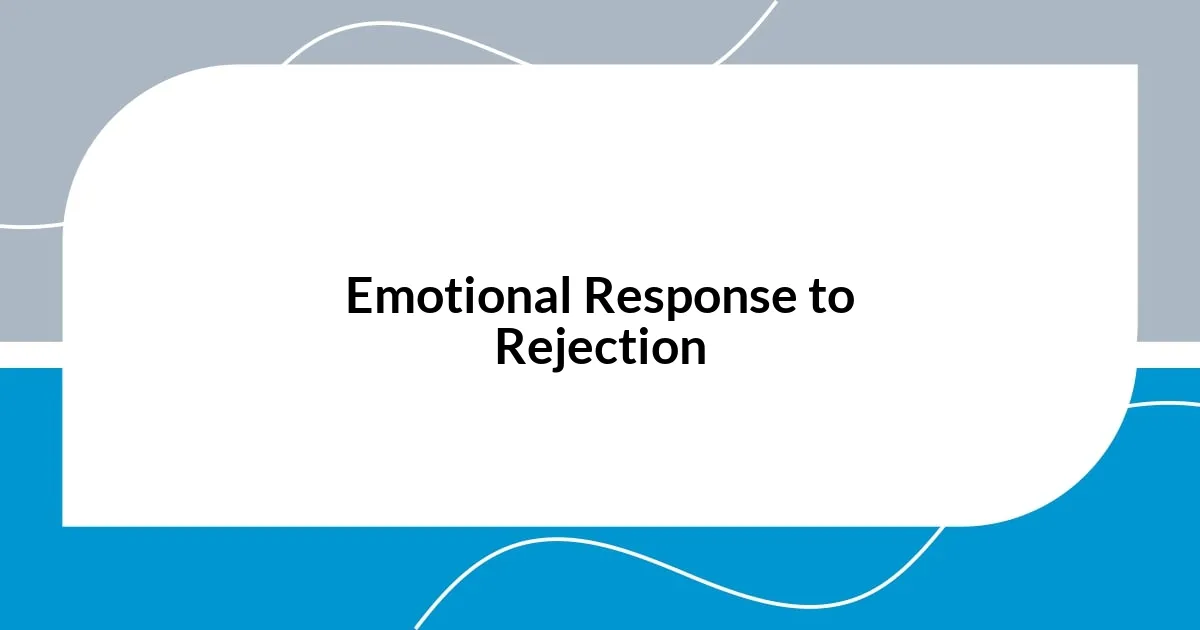
Emotional Response to Rejection
Rejection letters can trigger a whirlwind of emotions, ranging from disappointment to self-doubt. I still remember opening a rejection email for a project I had poured countless hours into, only to feel a heavy weight settle in my stomach. That feeling of inadequacy is common; it’s like holding a mirror to your self-worth, and the reflection isn’t what you hoped for. I’ve learned that allowing those emotions to surface is important. Acknowledging my feelings helps put things into perspective, allowing me to process the disappointment rather than bury it.
Interestingly, I’ve noticed that my emotional response to rejection often depends on the stakes involved. For example, receiving a rejection for a minor role in a local play didn’t sting nearly as much as facing rejection from my dream job. That particular setback felt like a punch to the gut and ignited a fire of determination rather than despair. How do you handle these contrasting emotional responses? I’ve found that channeling the pain into motivation can be incredibly empowering—it turns a moment of hurt into a driving force for self-improvement and persistence.
Over time, I’ve come to understand that my emotional journey following rejection tends to follow a pattern. Initially, there’s shock, followed by disappointment, but eventually, I find a way to redirect that energy toward growth. After a recent rejection, I took some time to reflect and journal about my feelings. This practice clarified my thoughts and grounded me in the reality that rejection is merely a single chapter in a much larger story. Embracing those emotions has made me realize they’re all part of the process, leading me to more resilient and informed applications in the future.
| Emotional Stage | Personal Insight |
|---|---|
| Shock | Initial disbelief often leaves me questioning the reality of the situation. |
| Disappointment | It feels like a heavy weight, reflecting my perceived self-worth at that moment. |
| Determination | I often channel the pain into motivation, driving me to improve and apply for new opportunities. |
| Reflection | Journaling has helped me process my emotions and clarify my thoughts for future endeavors. |
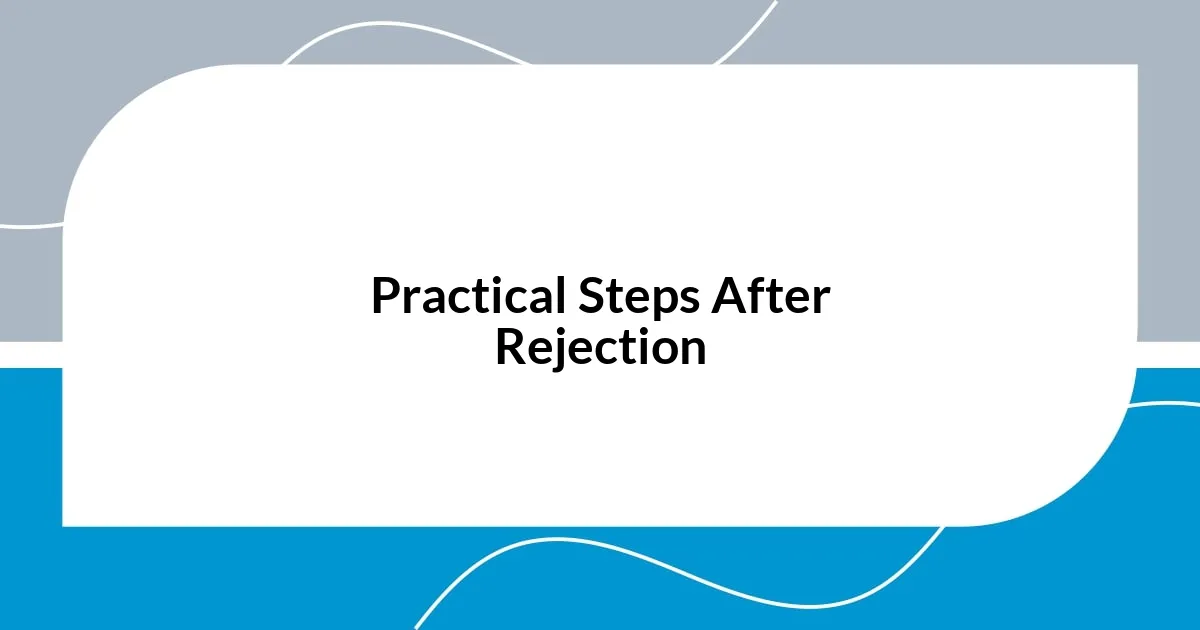
Practical Steps After Rejection
After receiving a rejection, the first step I take is to allow myself a brief moment of disappointment. I remember a time I didn’t get a promotion I felt was deserved. Instead of dwelling on it, I used that feeling as a catalyst for action. I took a day to gather my thoughts and then focused on how I could enhance my skills or even gather feedback from my manager. This approach not only eased my frustration but also turned it into a constructive path forward.
Once I’ve processed my emotions, I seek feedback. I think about a particular job I applied for that didn’t pan out. I reached out to the hiring manager, and although I wasn’t guaranteed a response, I genuinely wanted to understand where I could improve. When they finally replied, I was given insight into how my experience didn’t align perfectly with their needs. That clarity reshaped my future applications and helped me see my own strengths more clearly. Have you ever sought feedback in a similar situation?
Finally, I set goals based on my reflections and newfound knowledge. After a setback, I created a list of specific, actionable steps to enhance my profile—all aimed at ensuring I wasn’t just applying blindly but rather refining my approach. I started a side project to bolster my resume and even signed up for an online course that aligned with my career objectives. By taking control of the narrative, I shifted my energy into a proactive mindset, which ultimately empowered me to tackle the next opportunity with renewed vigor and purpose. It’s amazing how transforming rejection into actionable goals can set you on a path to success.
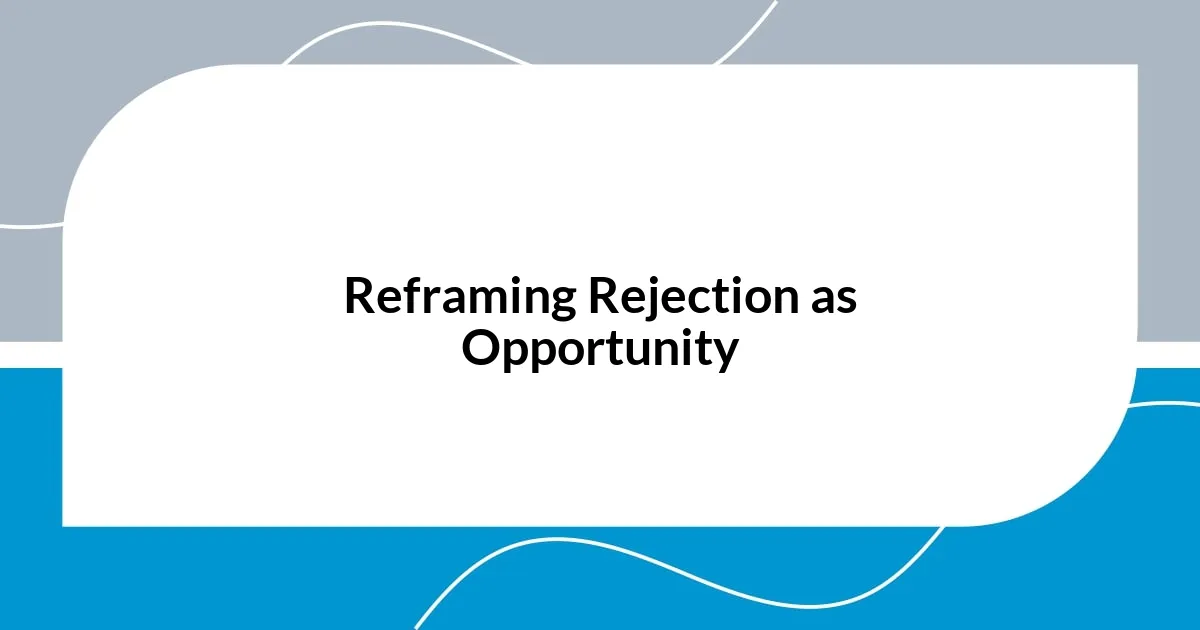
Reframing Rejection as Opportunity
Reframing rejection as an opportunity has been a game-changer for me. One time, I submitted a proposal that I was really proud of, only to receive a generic rejection email days later. Instead of sulking, I took a step back and questioned what I could learn from the experience. Was there a detail or insight that I might have overlooked? This led me to dive deeper into research, ultimately enriching my next proposal and making it stronger. Have you considered how a setback might be your greatest teacher?
I’ve also found that rejection can push me out of my comfort zone in the most unexpected ways. I recall a time when I faced rejection after auditioning for a well-known theater company. Instead of viewing it as a dead-end, I took it as an opportunity to explore new genres of performance. I signed up for improv classes, which not only sharpened my skills but also opened doors to networking opportunities I hadn’t considered before. It’s fascinating how stepping away from disappointment can lead us to discover new passions and paths. What new direction might you uncover after a rejection?
When I actively choose to view rejection as an opportunity, I create a mental checklist for the future. I might ask myself, “What did this experience teach me?” or “How can I use this moment to fuel my next steps?” Recently, after failing to land a freelance gig, I took the time to revamp my portfolio based on that self-assessment. I incorporated feedback I had received and showcased projects that demonstrated my growth. That process not only rebuilt my confidence but also set the stage for future successes. How do you think reframing rejection can change your outlook?
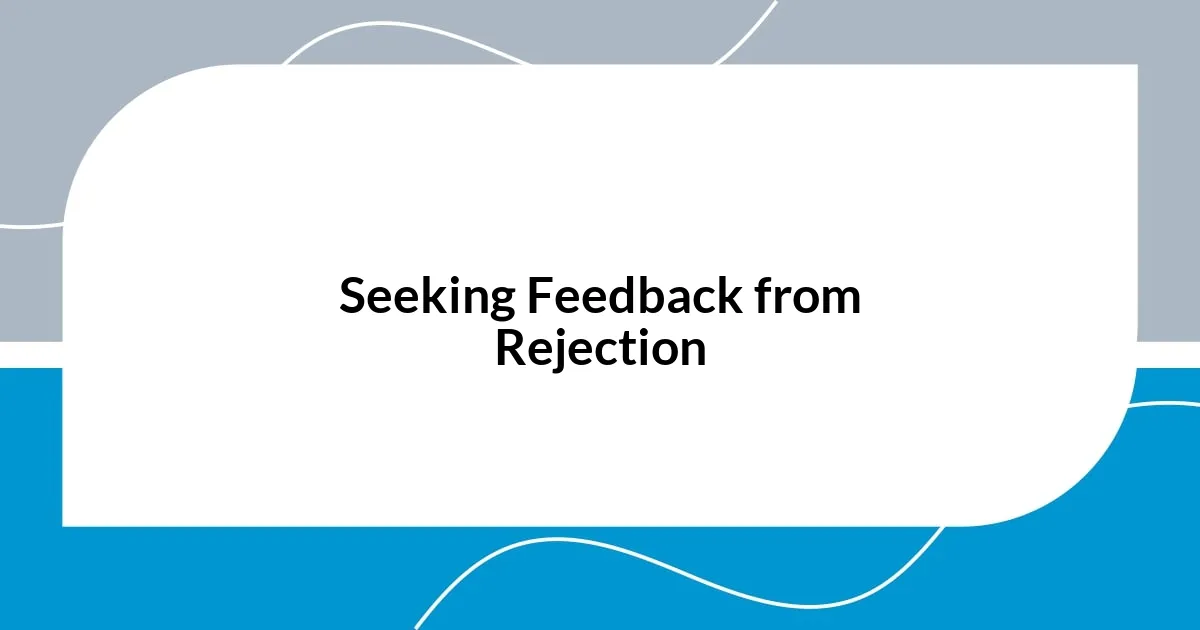
Seeking Feedback from Rejection
Seeking feedback after a rejection can feel daunting, but it’s often one of the most rewarding steps I take. I remember receiving a rejection for a project I poured my heart into. It stung, and I hesitated, but I mustered the courage to ask the decision-maker for feedback. Their response illuminated aspects I hadn’t considered, like clarifying my project’s potential impact. That insight was invaluable; it not only made my work stronger but also bolstered my confidence in future submissions.
Sometimes, the feedback I receive can catch me off guard. For instance, after not making the cut for a writing competition, I reached out to the judges. I didn’t expect much, honestly, but they emphasized the need for clearer storytelling. It was tough to hear, but this raw honesty pushed me to refine my craft and embrace vulnerability in my writing. How often do we shy away from critique that could lead to growth? I learned that asking for feedback allows me to turn those painful moments into lessons that sharpen my skills.
I’ve found that combining feedback with my reflections can create a powerful blueprint for improvement. After a series of rejections early in my career, I decided to create a visual map of the feedback I received, noting the themes and recurring suggestions. This roadmap became a visual testament to my journey, helping me see patterns I could address. It felt empowering to pinpoint specific areas for growth instead of feeling lost amidst a sea of rejection. How might you visualize your feedback to transform it into actionable steps?
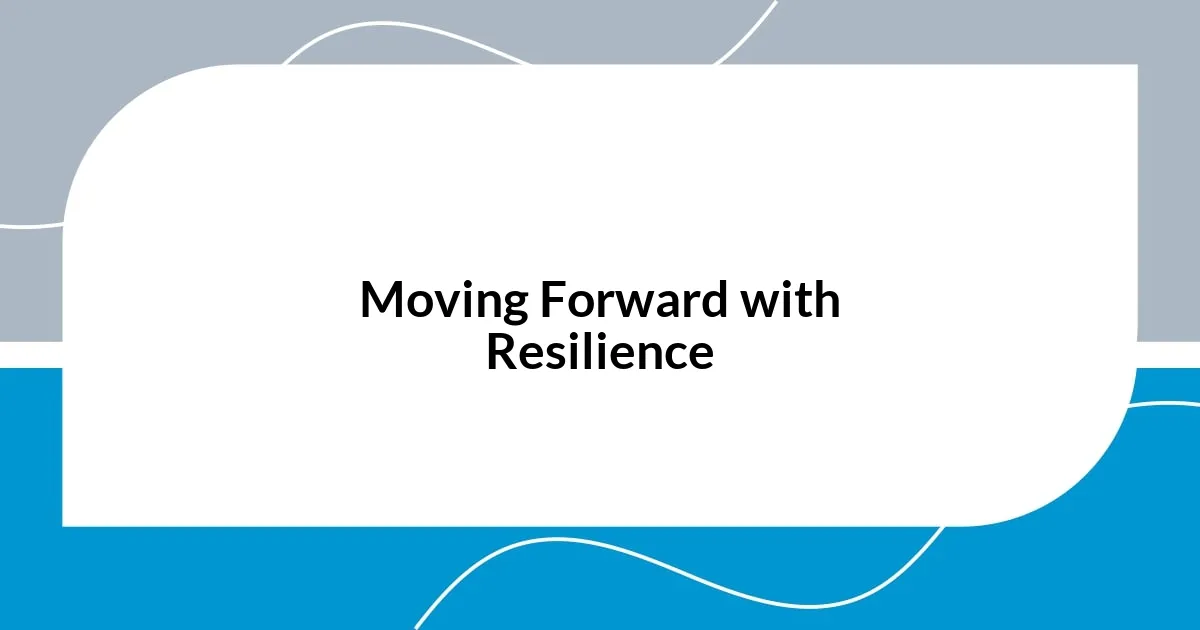
Moving Forward with Resilience
Moving forward after facing rejection requires a unique blend of grit and perspective. I recall a period in my career when I was passed over for a role that I had set my heart on. Instead of retreating, I leaned into the disappointment and asked myself what I could control. It was empowering to shift my focus from the rejection itself to the actions I could take, such as seeking mentorship and taking on projects that aligned with my interests. Have you ever noticed how focusing on your next steps can reignite your passion and determination?
Resilience doesn’t just mean bouncing back; it means growing beyond the setback. One poignant moment for me was when my art submission was denied entry to a prestigious show. At first, I felt crushed, but then I took a step back to reassess my artistic voice. This moment led me to experiment with new techniques and themes that felt more authentically “me.” What if that rejection was actually a nudge toward discovering a deeper layer of your creativity?
I’ve learned that sharing my experiences of rejection with others can cultivate a support network that fosters resilience. I remember chatting with a friend about my recent rejections and how they affected my morale. To my surprise, they shared their own tales of failure and triumph, reminding me that even the most successful individuals face hurdles. This exchange didn’t just provide comfort; it fueled my desire to push forward despite the setbacks. How often do you connect with others to share your experiences and draw strength from their journeys?